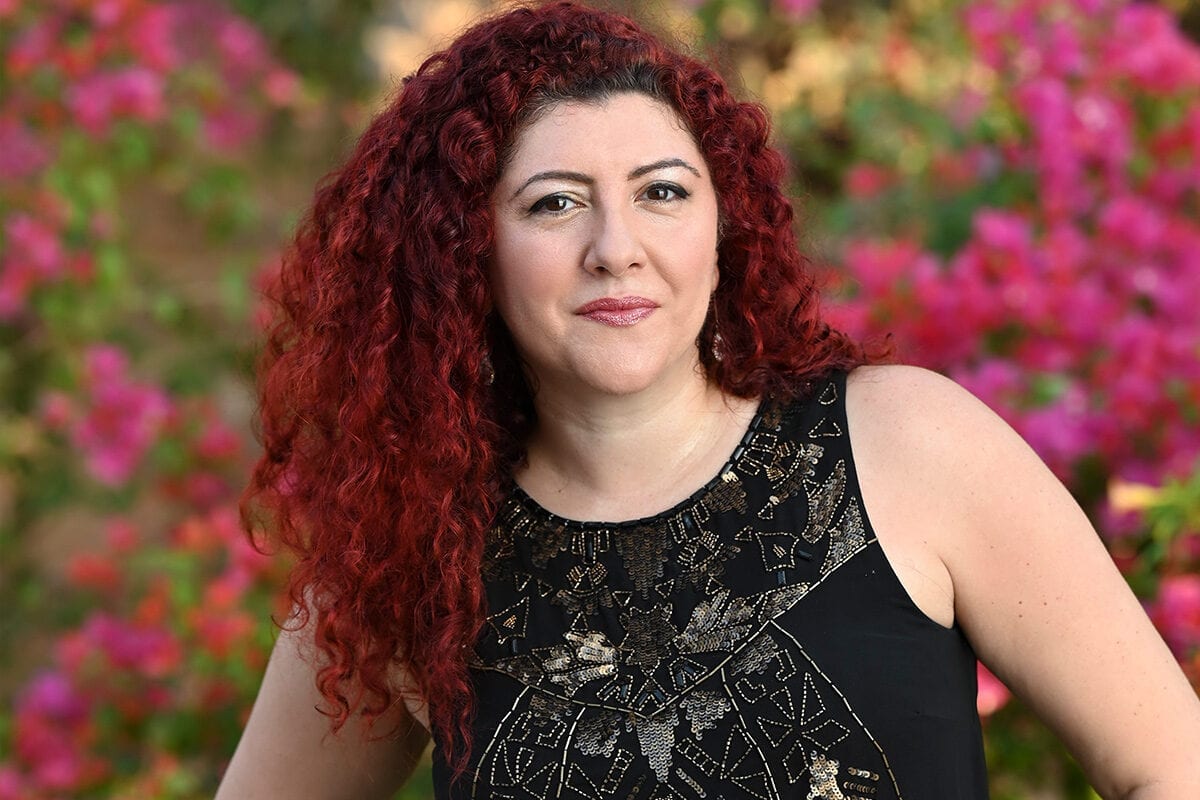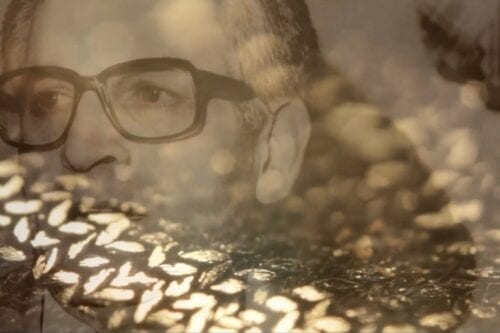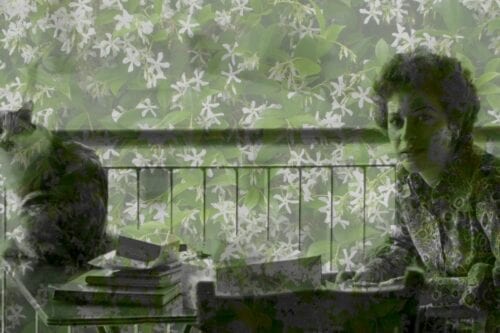
Artist, director and poet Hind Shoufani, 14 October 2017 [Ammar Abd Rabbo]
Naima Morelli
naimamorelli
December 16, 2020
Artist, director and poet Hind Shoufani insists that her Palestinian-ness is a political act. "It is a choice to be on this side of history," she tells me, "whether we triumph or not, whether I carry some piece of identification paper with blue colours on it, or green colours on it, or rainbow glitter tie-dye on it."
Born in the Palestinian diaspora in Sidon in 1978 to Palestinian parents, both of whom were activists, Shoufani has for years explored her Palestinian identity through different expressions of her art: "In this life I have chosen to use my language and my camera, and my body performing on stage, and my angry throat dialectics, to commemorate our regional experience, to add to this arsenal of cultural memory, communal histories and personal perspectives."
A passionate storyteller, Shoufani has lived in a number of countries and cities: Damascus, Amman, Beirut, New York and Dubai. "When I was about 8 years old my dad, in his infinite lovely wisdom, told me it was a great thing to combine in me so much of the world. 'This is a gift and a good thing,' he told me. 'Embrace it', and so I have."
She started to work at eighteen, and for the past 24 years or so the red-haired powerhouse artist has moved around juggling freelance gigs. "I mixed my innate linguistic skills that are part DNA, part my mother and father's literary interests, and partly the fact that we read immense amounts of books growing up — there was little else to do in Damascus in the 80s — with my film studies to create a 'career' that straddles the worlds of language and video, in many capacities," she explains. "Some for clients, others for love. And some, for both."
With strong ties to Palestine, Shoufani was only able to go back in 2017, after 20 years of absence. "I am not someone attached to the idea of home," she says. "Home is wherever my contact lens solution, walking shoes, glitter eyeshadow and laptop are. But I wanted to experience the Galilee. I wanted something exquisite to ease my spirit. It was time to summon the witchcraft needed to cross those borders and ask some questions and tell some stories."
With an undefined idea for making a new movie, Shoufani, cameraman Nick Zajicek and producer Ossama Bawardi from Philistine Films began to do some research into Christian minorities, and found out that only a limited number of engaged and political communities were aware of the situation of Palestinians in the Christian Arab villages in Galilee. This research led to a visit to her large extended family in Nazareth and Miilya, without a precise plan in mind.

Trip Along Exodus (TAE)
"That first year we spent a month there in the gorgeous summer," she recalls. "Every day was a spell of exuberant overwhelmed senses and tears and laughter and drinking and smoking and eating plenty, and telling stories, and asking millions of questions, and touching a thousand succulents, and feeling a breeze to die for and dancing and dancing."
When filmmaking took over, the family introduced her to characters in the community, rituals, rites, locations, histories, events and experiences. Bit by bit, Hind and Nick visited eight different towns and cities over the course of the following three years, developing a relationship with a cast of characters who allowed them to gain an insight into their minds, homes and histories.
"My most profound takeaway from all this, before the film is edited and released, is gratitude that I was allowed such intimate access to these communities. I have a huge responsibility to do justice to the experiences I was invited to share and document."
The result of that experience is her new documentary, They Planted Strange Trees. It is focused on beauty as an act of will and resistance. "I wanted to make a film about the love I feel, and not the hate. I have perhaps given enough time for the hate, and it is a moment to remind myself of love, so that I, myself, can remain soft, open to the senses and ready to see beyond the anger."


She thinks that occupation is first and foremost a dulling of mind and will, and beauty counters this. "I cannot belittle the occupation's atrocious impact on the lives of millions, but we still move through the mountains and immerse ourselves in the sea, we still enjoy our coffees and touching the hair of our grandchildren. This is beautiful. The quotidian, the taken-for-granted is so heightened for me in Palestine."
She stresses that every time a Palestinian laughs, dances, makes love, gets wildly drunk and hugs a friend, performs a poem on stage, or gets a standing ovation at a concert, the occupation is a little less powerful in its sting. "We have in our skin, in our food, in our eyes and in our spirits enough beauty to see us through the harshness."
Palestine as a subject matter has been explored by the director before from different angles. In her debut film Trip Along Exodus, she looked at 70 years of Palestinian history through the experience of her father, activist Elias Shoufani. She believes that that film is the opposite of They Planted Strange Trees.
Trip Along Exodus was a film edited completely inorganically, combining different footage from over 20 sources shot over a period of 60 years. "Nothing was left as pure observation," Shoufani points out. "We made a film from a collage concept, like a child sticking random things into a sketchbook."
The new documentary, meanwhile, is almost pure observational work, with one camera and one camera person. "Everything was filmed by our star Nick Zajicek, who is essentially the person who made this film possible by offering his craft, time and dedication. No images from the past. No archive, no multimedia, no outside influences. The film is one unit, with one look, and through one central journey."

Trip Along Exodus (TAE)
The other difference is that Trip Along Exodus is about one man, and through him we see a lot of the regional dynamics. In They Planted Strange Trees, a dozen people all intertwine to speak of the central entity which is the land and the ecosystems that live within it: human, flora and fauna. "So it's from the outside heading inwards, whereas with my dad, I tried to work from within pointing outwards to the region and its history."
While the post-production of the new film was pushed back further and further because of Covid-19 — much to Shoufani's frustration – she has a plethora or projects to develop. There is a TV series about four female Arab poets; a short utopian, futuristic novella about Palestine in the year 2078; and a book about her mother's life and death in Amman and Damascus in the 1990s, to mention but a few.
Shoufani is also committed to nurture Arab art and poetry in the Middle East. Last month she launched the Barjeel Poetry Prize, inviting poets from around the world to respond to 20 works of 20th-century Arabic art from the UAE-based Barjeel Art Foundation collection. She was one of the three team members organising the competition. The idea was conceived by the founder of Barjeel Art Foundation, Sultan Sooud Al-Qassemi, who is an avid collector of Arab art, and curator Suheyla Takesh.
She counts herself fortunate to be asked to take part. "And I am grateful to be partnered up with my dear friends Zeina Hashem Beck, the poet, and publisher Marcia Lynx Qualey. We have received over 500 submissions of dual language poems as they relate to 20 pieces of Arab art from the Barjeel collection. What an inspired way to get people all over the world to engage with Arab paintings, and to think about what their artists have been through over the past century, and to recreate that ethos in poetic language."
The results are due to come out later this month, and the judges are really pleased with the range and diversity of the winning poets. This was the inaugural year, and Shoufani doesn't know what future plans there are for the prize, but she sees it as a gift in the "apocalyptic year of despair known as 2020."
The artist, director and poet embraces all of her commitments with her usual energy and passion. "I am relaxed because at my age, after living in so many cities, not everything can overwhelm you, and because while being in Palestine is a privilege and a gift, it is also merely another piece of land where some people I love happen to live. It is a part of who I am, and not the entirety. No one place is."
Nevertheless, she is gratified that she was able to return to her homeland, which is something that her parents could not do. "And perhaps there is a way to be more present there in the future," she concludes. "Eventually, at the end, I would like to be swallowed up by a mountain in the Galilee."


No comments:
Post a Comment